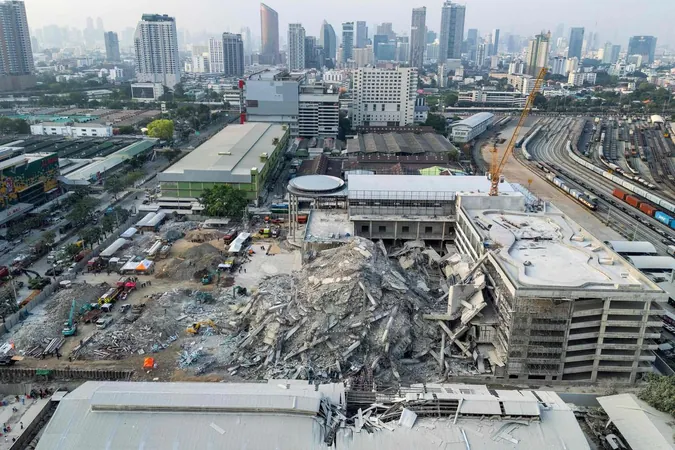
International Outcry as Chinese Contractor Faces Heat Over Bangkok Building Collapse
2025-04-01
Author: Mei
Introduction
In a stunning turn of events, China Railway No. 10 Engineering Group, a state-owned Chinese contractor, has come under intense scrutiny following the catastrophic collapse of a 30-storey building in Bangkok, Thailand. The structure, intended to house the Thai government's state audit office, crumbled on March 28 after a powerful 7.7-magnitude earthquake, killing at least 12 people and leaving 75 others unaccounted for.
Immediate Reactions and Company Response
Promotional videos showcasing the building's construction were swiftly removed from the company's social media platforms after the disaster. In these videos, the company proudly proclaimed this project as its first overseas super high-rise, depicting it as a significant milestone in its international portfolio.
Concerns Over Construction Practices
The collapse has raised serious questions over the construction quality and practices adopted by China Railway No. 10, especially given that it was operating in a joint venture with local giant, Italian-Thai Development (ITD). Although China Railway No. 10 holds a 49% stake in this partnership, recent events have fueled public outrage directed primarily at the Chinese contractor, amidst growing fears over rising Chinese influence in major Thai infrastructure projects.
Wider Implications of the Disaster
While the earthquake also caused significant devastation in neighboring Myanmar, with over 2,000 reported deaths, images of the Bangkok building's collapse quickly circulated online, igniting discussions about safety standards in the construction industry. The event has not only shocked the local community but also drawn attention to the broader implications of foreign investment in Thailand’s development landscape.
Government Investigation and Accountability
Responding to the fiasco, Thai Prime Minister Paetongtarn Shinawatra established a committee of experts to thoroughly investigate the collapse. Observing that the Bangkok structure was the only one to suffer catastrophic failure, she reassured the public that accountability would be pursued rigorously. Meanwhile, samples of construction materials are being examined by officials, particularly focusing on the integrity of steel bars used in the building's framework.
Controversies and Detentions
Adding to the complexities of the investigation, police detained four Chinese nationals who allegedly tried to remove critical documents from the disaster site—an act violating exclusion orders meant to preserve evidence. This incident only compounds the controversy surrounding the construction project, hinting at possible negligence or misconduct.
Calls for Responsibility
As if the disaster wasn’t already echoing down the corridors of power and corporate responsibility, voices in the media have begun calling for the Chinese government to step up and take responsibility. Influential journalist Pravit Rojanaphruk emphasized the importance of a transparent cooperation between China and Thailand in addressing the tragedy.
Investment Context and Potential Backlash
On an investment note, China was reported to be the largest foreign investor in Thailand as of 2023, accounting for a quarter of the total foreign direct investment. However, this disaster could reshape perceptions, igniting a potential backlash against Chinese involvement in future infrastructure projects in the region.
Conclusion and Future Considerations
As investigations unfold, eyes will be on both Thai authorities and China Railway No. 10 to determine who ultimately bears the responsibility for this harrowing tragedy and what measures will be taken to prevent such disasters in the future. Will this event spark a tipping point in how infrastructure projects involving foreign investors are governed in Thailand? The world awaits answers amid the debris of a collapse that has left a nation in mourning.






 Brasil (PT)
Brasil (PT)
 Canada (EN)
Canada (EN)
 Chile (ES)
Chile (ES)
 Česko (CS)
Česko (CS)
 대한민국 (KO)
대한민국 (KO)
 España (ES)
España (ES)
 France (FR)
France (FR)
 Hong Kong (EN)
Hong Kong (EN)
 Italia (IT)
Italia (IT)
 日本 (JA)
日本 (JA)
 Magyarország (HU)
Magyarország (HU)
 Norge (NO)
Norge (NO)
 Polska (PL)
Polska (PL)
 Schweiz (DE)
Schweiz (DE)
 Singapore (EN)
Singapore (EN)
 Sverige (SV)
Sverige (SV)
 Suomi (FI)
Suomi (FI)
 Türkiye (TR)
Türkiye (TR)
 الإمارات العربية المتحدة (AR)
الإمارات العربية المتحدة (AR)